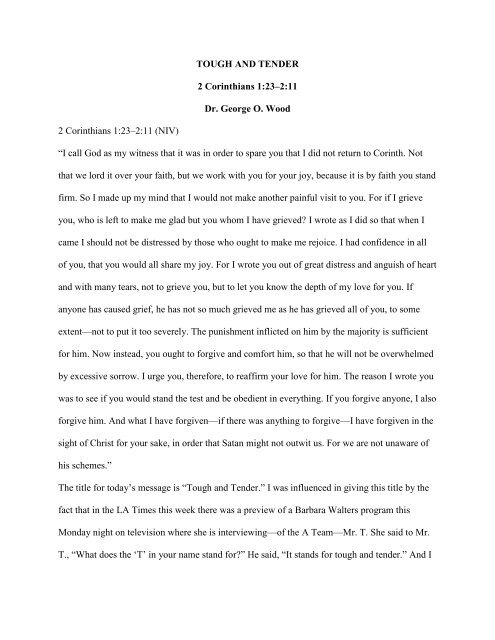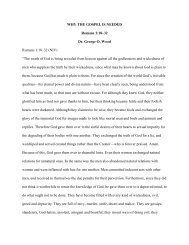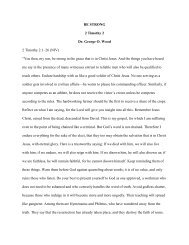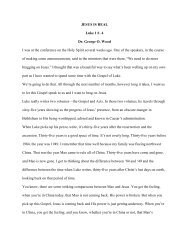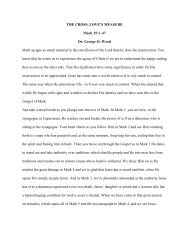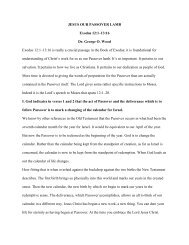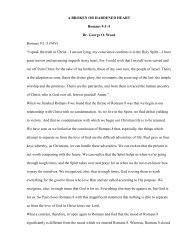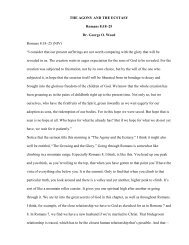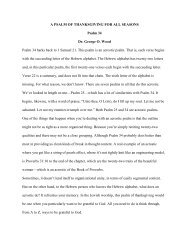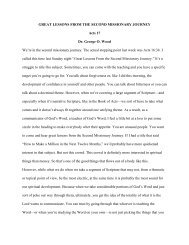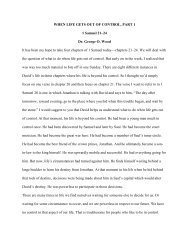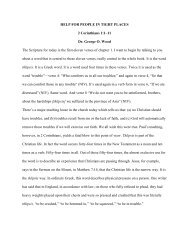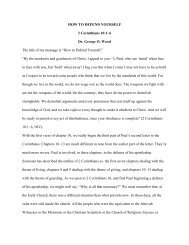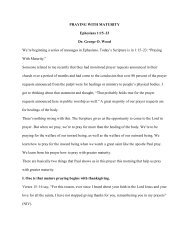03 TOUGH AND TENDER.pdf - Dr. George O. Wood
03 TOUGH AND TENDER.pdf - Dr. George O. Wood
03 TOUGH AND TENDER.pdf - Dr. George O. Wood
You also want an ePaper? Increase the reach of your titles
YUMPU automatically turns print PDFs into web optimized ePapers that Google loves.
<strong>TOUGH</strong> <strong>AND</strong> <strong>TENDER</strong>2 Corinthians 1:23–2:11mind would take a bag full of weed seed and sow it through some farmer‘s soil. You‘d have tobe criminal or sick, and the devil is both. Jesus is telling us that it is the purpose of the enemywithin the church to sow weeds. Therefore the devil‘s top priority is to destroy the leadership ofthe church. He will try to corrupt the leadership from within or subvert it from without. FirstTimothy 4:1 says, ―The Spirit clearly says that in later times some will abandon the faith andfollow deceiving spirits and things taught by demons.‖You know me well enough to know I am not the kind of person that looks for the devilpersonally under every bed. So I‘m not trying to scapegoat and say all problems are the directresult of personal instigation of the devil. But I think we are wise enough to recognize thatbehind every human problem the devil is at work seeking to exploit it for his advantage. Thereare occasions when indeed the devil, working through human personalities, does deceive.B. The second reason why people abandon godly leaders: There is a human desire to find leadersand teachers who tell us what we want to hear or speak to us in the way we want to hear it, waysthat we ourselves would like to be affirmed, gospels that we would like to hear preached thatseem to satisfy us and what our desires may be. Paul says to Timothy in 2 Timothy 4:3, ―Thetime will come when persons will not put up with sound doctrine. Instead, to suit their owndesires, they will gather around them a great number of teachers to say what their itching earswant to hear.‖ That is certainly a problem at Corinth and it‘s a contemporary problem as well.Sometimes even, it‘s not what a false teacher is saying that we want to hear, it may even be thatwe won‘t hear a message unless it is said in a particular kind of way. Sometimes we abandongodly and wise teaching and counsel because the way it comes to us is not a way that we esteemto be spiritual. I reflect back upon my early years as a Christian and my own preparation for theministry. I literally thought there were three words that described good preaching. And unless4
<strong>TOUGH</strong> <strong>AND</strong> <strong>TENDER</strong>2 Corinthians 1:23–2:11We must take this problem of authority seriously in our lives. Because we must all come to gripswith who our authority is. Is our authority from within ourselves? Is it from what others tell us?Or is it from tradition? Or is it from the Word of God? If there are those who come to us who aregodly in their leadership and they declare to us the Word of God, then we have no reason forabandoning that counsel and that ministry.There‘s a story told of an officer in the Navy who had always dreamed of commanding his ownbattleship. He finally achieved his lifelong dream and was given the commission of captainingthe newest and proudest ship in the fleet. One stormy night, as his ship plowed through the sea,the captain was on duty at the bridge when off on portside he noticed a strange light rapidlyclosing in on them. He immediately ordered the signalman to flash the craft this message, ―Alteryour course ten degrees to the south.‖ Almost immediately, the reply came back, ―Alter yourcourse ten degrees to the north.‖ Determined that his ship would take a back seat to no other, thecaptain snapped out an order to be sent, ―Alter your course ten degrees. I am the captain!‖ Backcame the response, ―Alter your course ten degrees. I am seaman third class Jones.‖ Nowinfuriated, the captain grabbed the signal light and with his own hands fired off, ―Alter yourcourse. I am a battleship.‖ Back came the response, ―Alter your course, I am a lighthouse.‖All courses must be altered to God‘s Word. That is the principle Paul is contending for atCorinth. Sometimes when you read Paul, doesn‘t he sound a little argumentative? What is soimportant to defend? His authority…how important is that? Is he on an ego trip or what? No,he‘s telling people, ―You‘ve got to get back to the lighthouse. You‘ve got to alter your ways andconform to God‘s ways. If you don‘t, you‘re abandoning it and you‘re going to shipwreck inyour faith.‖II. The second question which arises out of this passage is: How do you correct a wrong?6
<strong>TOUGH</strong> <strong>AND</strong> <strong>TENDER</strong>2 Corinthians 1:23–2:11It‘s possible to say something that is right, but say it in a manner that is so wrong that whatyou‘re trying to say isn‘t heard at all. The tone of voice we take in correcting a problem, cheapshots, harsh ridicule, demeaning terms like ―blockhead‖ and ―dummy‖ do not come from personswho practice Christlike correction.I recall someone commenting—and this is an old story—about a preacher who was thunderingagainst sin. They said, ―He seems to be taking a little bit too much glee in his denunciation of thesubject.‖Paul finds no joy in giving discipline. There‘s no better-than-thou attitude. In fact, there is anattitude that says, ―I have prayed for this person before I ever sought to discipline him.‖ What aprinciple to keep in mind when we are at odds with someone! If we will make—before we sayanything—if we‘ll make that person a matter of our own prayer, really care about them in prayer,our whole attitude toward them is going to have to be shaped and changed because we‘ve beenpraying about it. Have we prayed for the person we‘re attempting to correct?B. We must not only avoid a better-than-thou domineering attitude but I think the secondimportant thing, and Paul demonstrates this: We‘re to communicate clearly what is wrong andwhat steps need to be taken to make things right.Paul had done this, certainly in the 1 Corinthians‘ context; he told the church exactly what to dowith the man who had been living with his father‘s wife. And evidently, if this is not that personbut another person who rebelled against his authority, he had also told the church what to do.The majority of the church had acted and disciplined that person. It always helps when we arevery expressive in being exact as to where we see a wrong and how we‘d like to see anotherperson change. They can‘t change unless we tell them. They can‘t know that they‘ve donesomething wrong unless we find a way to communicate that to them.8
<strong>TOUGH</strong> <strong>AND</strong> <strong>TENDER</strong>2 Corinthians 1:23–2:11Failure to communicate results in what‘s called ―anger displacement.‖ There‘s a delightful littlestory about the husband who got chewed out at work by the boss. He knew he couldn‘t answerback to the boss so he came home and chewed out his wife. She knew she couldn‘t answer backto him so she went and bawled out their teenage boy. He went and kicked the dog. And the dogwent and bit the cat. And the cat scratched the baby. And the baby pulled the doll‘s head off.Nobody was talking to anybody about why they were mad. They were just taking it out on thenext person down the line. We need to do more than say what‘s wrong. We need to be explicitabout it and tell someone how it can be made right.C. The third critical principle of correcting a wrong revealed in this passage is that we are tokeep perspective. The one who is now a source of grief to us is the same one who is meant tobecome a source of joy. Paul very clearly says in verse 2 of chapter 2, ―For if I grieve you, whois left to make me glad but you whom I have grieved?‖ What a tremendous way of looking at aperson with whom we have disagreements. They are a source of grief to us. But Paul says, ―Youmust see it this way: they—that same person who is causing you grief—are meant by God, theirplacement in the body of Christ, is meant to be a source of joy for you.‖ If we take theperspective that they‘re always going to be a millstone around our neck, that they‘re alwaysgoing to be a source of grief to us, then we‘ll always treat them that way. We‘ll push them outthere and not give them any hope for change. We‘ll not give ourselves any hope for change at all.But to see that a person that is grieving us now is the same person that‘s capable of giving usgreat joy of a healing flow created in that relationship…that changes our whole attitude.How that ought to be a perspective, especially in family. I wouldn‘t be a bit surprised that in anaudience of this size there may just be a husband and a wife that have really had a spat this week.And have come here to church today with that unreconciled. You‘re getting ready to take9
<strong>TOUGH</strong> <strong>AND</strong> <strong>TENDER</strong>2 Corinthians 1:23–2:11communion and maybe you‘re looking at it and saying, ―Oh no! I forgot it was communionSunday!‖ That one who has been a source of grief to you is the same person who is meant to beby God a source of joy to you. In working through that, don‘t lose sight of the fact that mate ofyours who has caused you sorrow is the one who will bring you and brings you the greatest joyin your life. Approach whatever problem you have from that vantage point. You want to turn thisrelationship of grief into a relationship of joy. How can we do that? Can the Lord help us to dowhat we‘ve not been able to do for ourselves?D. The fourth thing, and one of the most difficult things to do in correcting a wrong, is to avoidtaking things personally. To distinguish between issues and personality. This is so difficult. Pauldemonstrates that he‘s been able to do this, though in verse 5, he says, ―If anyone has caused yougrief he has not so much grieved me as he has grieved all of you, to some extent—not to put ittoo severely…[Then later in verse 10] And what I have forgiven—if there was anything toforgive.‖ That is, he‘s already forgiven it so there‘s nothing left to forgive. He‘s already done it.He was able to take the attacks directed against him and stayed away from being touchy.When we are in conflict with another person, we need to be strong enough in our own spirit tothrow them a lifeline. We can‘t do that if we are preoccupied with self and how we‘re going tobe perceived and how we‘ve been hurt. God wants us to be strong enough within our own hurt toreach out and help the person out of their hurt. And it is by helping the person out of their hurt,and redirecting the focus of our energy from ourselves to them, that great healing is able tocome. Avoid taking things personally.This then brings a third question to mind as we look at this passage. Not only ―Why do peopleabandon godly leaders?‖ and ―How do you correct a wrong?‖III. A third question that arises from this passage is: Why should we forgive?10
<strong>TOUGH</strong> <strong>AND</strong> <strong>TENDER</strong>2 Corinthians 1:23–2:11There are Corinthians that are asking that, ―Why should we forgive? We‘ve disciplined the guy.We think he should suffer a little bit longer. Let him squirm a while. He caused us to squirm, youlet him squirm.‖ Some indeed are very quick to punish and very slow to forgive. God wouldalways be more pleased if we‘d be quicker to forgive than to punish.Why should we forgive?A. We should forgive for the sake of the one who has done the wrong. That‘s the first reasonPaul says, ―So that he will not be overwhelmed by excessive sorrow‖ (2 Corinthians 2:7, NIV).The word ―overwhelmed‖ in the New Testament is used in 1 Peter 5:8 to describe a lionoverwhelming or devouring his prey; in Hebrews 11:29, of the Egyptians being overwhelmed ordrowned in the sea; it‘s used in 1 Corinthians 15:54 of death being swallowed up oroverwhelmed by the resurrection of Jesus. So here the repentant person is being overwhelmed intheir isolation and exclusion and sorrow. Paul says, ―If you keep this up, if you don‘t forgive,you‘re going to cause that person to drown in their sorrow. But you must forgive and comfort.‖The word which is used for ―forgiving‖ here is literally ―to give grace to,‖ ―to give charis to,‖―to charistisize‖ and ―to encourage.‖ To forgive and to comfort is to act graciously toward and toact with help toward.So when someone has done wrong and they are repentant, we‘re under the obligation—for theirsake—to forgive; that they might not undergo undue sorrow which God does not want for themand would totally discourage them.B. The second reason why we should forgive is that our forgiveness is our own test of obedienceto Jesus. Paul says in verse 9, ―The reason I wrote you was to see if you would stand the test andbe obedient in everything.‖ Now he‘s calling upon them to be obedient. Once they‘ve beenobedient to discipline him, now it‘s to be obedient to forgive. Jesus explicitly says in Luke 17:3,11
<strong>TOUGH</strong> <strong>AND</strong> <strong>TENDER</strong>2 Corinthians 1:23–2:11―If your brother sins, rebuke him, and if he repents, forgive him.‖ Tough and tender. If he sins,rebuke. If he repents, forgive.C. Then thirdly we‘re to forgive so that Satan will not get an advantage over us. It‘s an intriguingphrase in 2 Corinthians 2:11, ―in order that Satan might not outwit us [or, ―secure an advantageover us‖). For we are not unaware of his mindset.‖ The Greek word is the word nous whichstands for ―mind, pattern of thinking.‖ We‘re not unaware of the way he thinks. How does Satanthink? He wants to produce unforgiving people. He wants to produce an unforgiving church.Why does he want to do that? Because if he can produce that, he‘ll get a whole collection ofharsh and judgmental people. And there‘s nothing that will kill the work of God quicker than agroup of harsh, critical, judgmental, argumentative, and pharisaical people. There‘s nothing Iknow of that will destroy God‘s work and God‘s cause and God‘s people quicker than that kindof spirit. So if he can turn that to his advantage and produce a bunch of cynics and a bunch ofcritics and a bunch of harsh-spirited, mean-spirited, little-minded people, then he‘s got anadvantage over the work of God.Paul says, ―We‘re not unaware of what he‘s trying to do. It‘s time, Corinthians, to forgive.‖In the war years, there was a practice called triage (it‘s a French word). It referred to a policy bywhich medical assistance was given through the means of color tags. In emergency medicalsituations on the battle field, where there were limited medical supplies, it was in some places thepractice to tag a wounded person. There were three tags employed: If the person looked like theyhad been wounded but were well enough to recover without much assistance, they were givenone color of tag; if they had been wounded so severely that it looked like they would die nomatter what medical assistance they were given, they were given another tag, a tag thatrepresented hopelessness—leave them alone, let them die; a third tag was given to a person that12
<strong>TOUGH</strong> <strong>AND</strong> <strong>TENDER</strong>2 Corinthians 1:23–2:11was critically wounded who would not recover on their own but might recover if they were givenmedical assistance.There was a man—in a story told by David Rockhill of Rockport, Indiana—a man named Lewon the battlefield who was badly blown apart. One leg was severely wounded. The doctor whoexamined him made the decision that Lew was a hopeless case, that he would not recover even ifhe had medical assistance. So he was given the color of death—―leave him alone.‖ But a nursenoticed that Lew was conscious and began to talk to him. In the course of their conversation,they discovered that they were both from Ohio. The nurse did something which was against theregulations. She just couldn‘t let him die that way so she changed his color to the third color thatsuggested a positive prognosis if he were given medical assistance. So Lew was picked up by themedics, taken on a two-day trip on the back of a truck to the hospital. He spent months in thehospital but he made it. He met a girl in the hospital who later became his wife. He went on tolive a full, happy life with one leg. All because a nurse broke the rules of triage and changed histag. Someone has said, ―It is the task of the church to go around changing tags.‖ That‘s whatPaul is doing at Corinth. There is a man who has been discipled that has been regarded ashopeless and the church has excluded him. Paul is saying, ―It‘s time to change the color. He willrecover. Forgive him and get on with it.‖Closing PrayerOur gracious Father, we thank You for the ways that You have spoken to our hearts today. First,Lord, You‘ve spoken to us about Your character because You are tough and tender. Your lawrepresents that tough side of You. That side which makes requirements and demands. Your gracerepresents that tender side of You which receives ―whosoever will.‖ Which gives forgivenesswhen there is repentance. We thank You. We know more about Your character as a result of this13
<strong>TOUGH</strong> <strong>AND</strong> <strong>TENDER</strong>2 Corinthians 1:23–2:11message. There may be some here whose focus on You is distorted. They see You as all-tough orall-tender. All-tough and there‘s no hope for them because they‘ve erred too many times. Lord,correct them. Let them see You as the God who stands ready to encircle with Your love andforgiveness whoever gives grace. There may be some here who have a very cheap view of Yourgrace. Who see You as having no rules and just do whatever You want and it‘s ok with God.Help them to see that side of You, Lord, which brings discipline and order and requirements andholiness. There are relationships also, Lord, that You talk to us about at this time. Relationshipswith people. People we‘ve had arguments with. People we‘ve disagreed with. People whom wehave animosity in our heart toward. Search us, Lord. Help us to realize that the person who is thesource of grief to us can be, with Your grace, a source of joy to us. Help me, O God, and help us,to be ready to change the tags we put upon others. We thank You for this communion time. Weask that, as we worship You now, there will be a real time of healing that occurs in our worshipand we‘ll sense Your nearness to us. So visit us with Your glory to reveal Your presence to us inprecious ways. We thank You that we know You, that you seek fellowship with us, that You loveus. In the Lord‘s name, we ask. Amen.14


